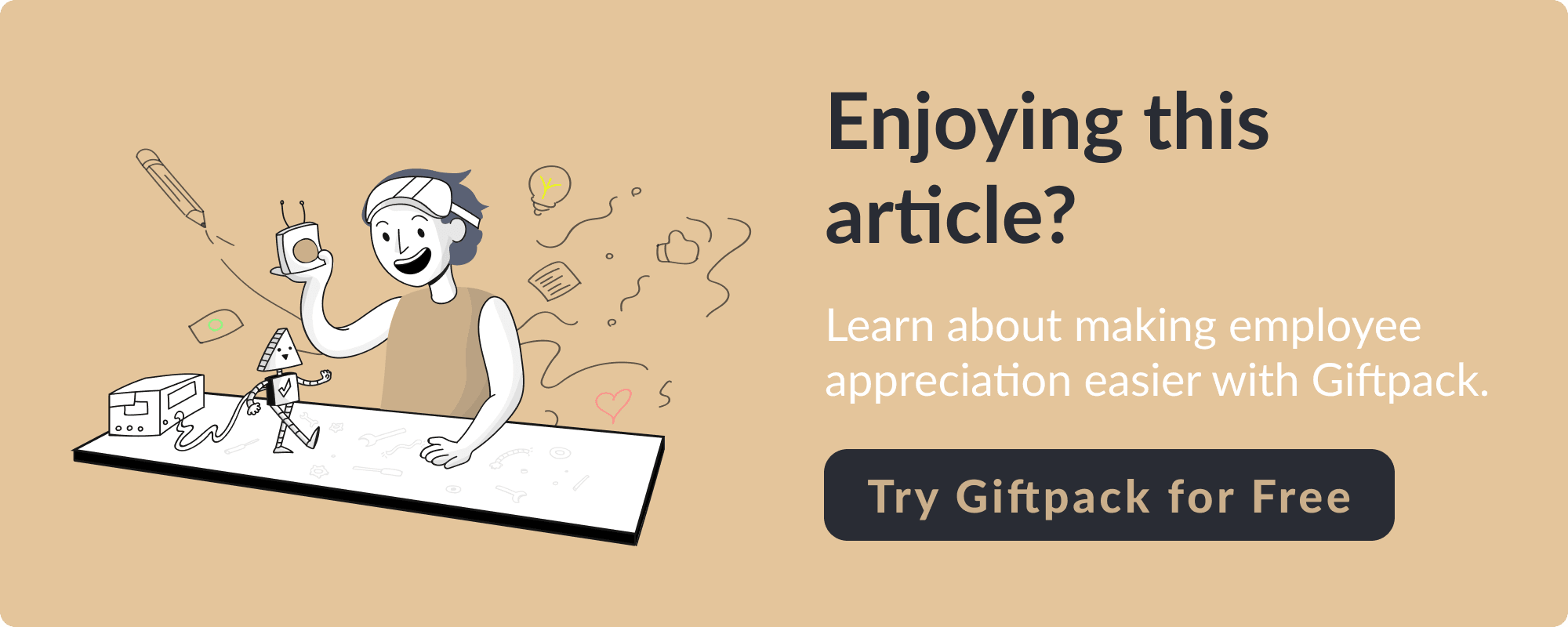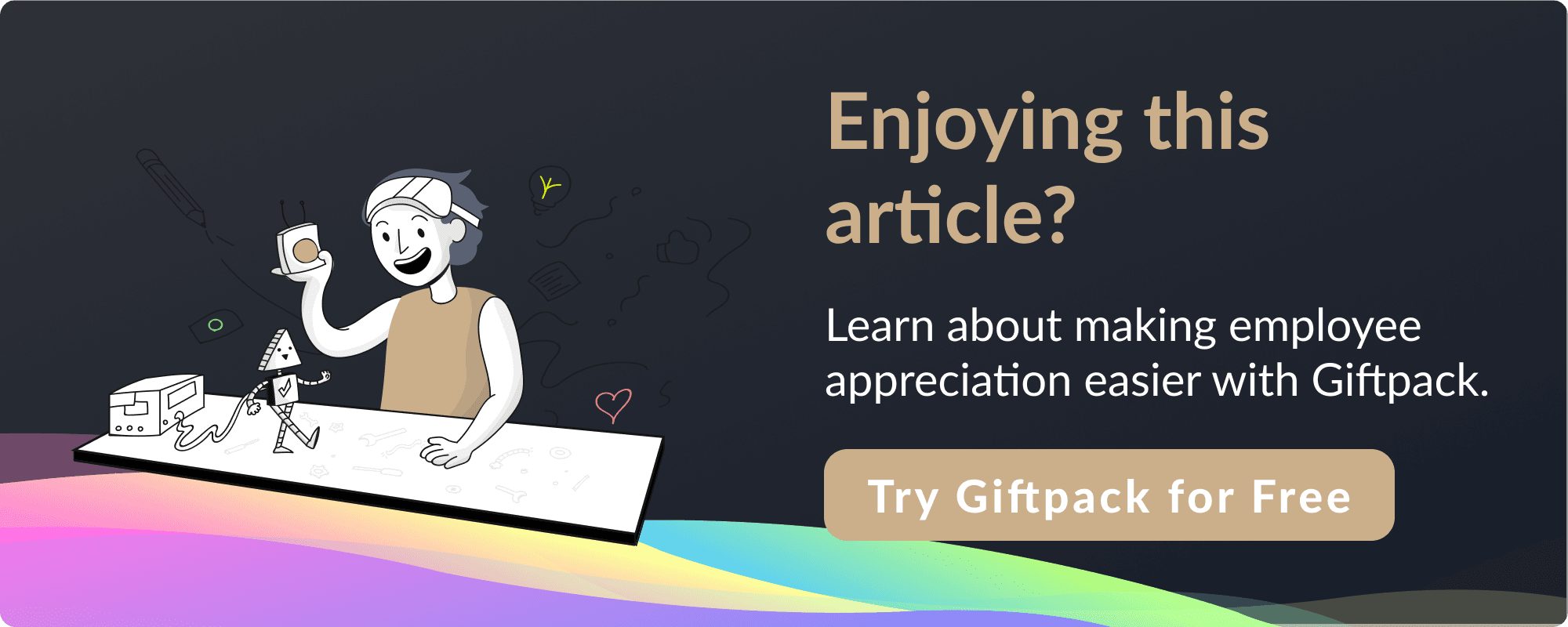
Creating an onboarding process is like setting the stage for new hires to shine. It's not just about paperwork and logins. From day one, it's about making them feel welcome and part of the team. But here's where it gets tricky. If your onboarding process is inclusive, you're taking advantage of a crucial opportunity to engage and retain top talent. Inclusive onboarding is about creating a process that works for everyone, regardless of their background or experience level. This article will show you how to create an onboarding process that is both inclusive and effective so you can set your new hires up for success.
One way to do this is by incorporating branded swag into your onboarding process. Company branded swag can help new hires feel like they belong to your team from day one. It also communicates your company's values and culture tangibly.
What is an Employee Onboarding Process?

Employee onboarding is more than just a handshake and a stack of paperwork. It's a fluid process that transforms a newcomer into a thriving part of the organization. The scope of onboarding varies widely. Some see it as a quick, one-day orientation. Others embrace a more extended journey, spanning months or even a year and a half. What’s consistent is the starting point: once the offer letter hits the inbox, onboarding begins. This journey includes everything from initial orientation to training and feedback loops.
The Difference Between Onboarding and Orientation
Orientation is a single event, while onboarding is a process. Imagine orientation as the welcome mat, a quick introduction to the company’s mission, values, and basic policies. Onboarding is a guided tour. The comprehensive road map leads a new hire from day one to full productivity, ensuring they feel connected and capable at every step.
Why Does Onboarding Matter?
Effective onboarding is more than a nice-to-have. It’s a crucial strategy for engaging employees from the get-go. When done well, it can boost retention and productivity. New hires who feel supported and informed are likelier to stick around and contribute meaningfully. A well-structured onboarding process can help reduce the time it takes for new employees to reach their full potential, benefiting both the individual and the organization.
Employee Onboarding Workflow: The Blueprint
An employee onboarding workflow is your strategic plan. It’s a series of coordinated steps that help the new hire acclimate to their role and the company culture. This workflow might include a mix of activities, such as:
- Completing necessary paperwork
- Meeting team members
- Attending training sessions
- Receiving feedback on their progress
The goal is to provide a seamless experience that builds confidence and competence.
Creating an Effective Onboarding Process
Crafting an onboarding process that works well for the organization and the new hire takes careful planning. Start by identifying the key milestones that mark a successful transition from new hire to productive team member. Design activities that support these milestones, such as:
- Mentorship programs
- Regular check-ins
- Opportunities for socialization
Be sure to continuously gather feedback from new hires to refine and improve the process.

Related Reading
• Small Business Onboarding • Onboarding Remote Employees • Onboarding Phases • New Team Member Announcement • Onboarding Meeting • New Hire Onboarding Survey Questions • New Hire Orientation Survey • Onboarding and Training • Onboarding Goals
How to Create an Onboarding Process for New Hires in 10 Steps

1. Job Offer: The First Step
The onboarding process kicks off with the job offer. This should include:
- Detailed job description
- Salary details
- Other essential information
This sets clear expectations and opens the door for any negotiations. It's the first formal step in welcoming a new employee.
2. Pre-Onboarding: Getting a Head Start
Pre-onboarding includes everything, from filling out tax forms to signing employee handbooks. This phase can also involve sending a welcome package with branded merchandise or a note from the CEO. It eases the pressure on the new hire’s first day and excites them about joining your team.
3. Technology: Your Onboarding Ally
Incorporate technology to automate and personalize onboarding. Use performance management tools, digital signature apps, learning platforms, and project management tools. These tools help streamline the process and make it more engaging for new hires.
4. Onboarding Timeline: A Roadmap to Success
An onboarding timeline outlines when each step should happen, providing structure and clarity. This roadmap should detail when the process starts, how long it’ll last when training sessions occur, and who the new hire should meet. It also sets goals for the first day, week, and month.
5. Key Phases: Structured and Specific
Develop a roadmap for each phase of onboarding:
- Before the first day
- The first wee
- The first 90 days
- The first year
Before the first day, send a welcome email and provide access to necessary resources. On the first day, schedule orientation and assign a mentor. In the first week, introduce team structure and roles. In the first 90 days, set clear goals and schedule regular check-ins. Throughout the first year, conduct performance reviews and offer professional development opportunities.
6. Connections: Building Relationships
Facilitate introductions between new hires and their coworkers, cross-functional partners, and mentors. Create a list of everyone they should meet and schedule introduction meetings. Include time for them to meet their team members through group events or one-on-one meetings.
7. Culture: Engraining It In
Incorporate activities like presentations, handbooks, and interactive activities to introduce new hires to your organization’s culture. Facilitate cross-functional introductions and organize culture ambassador sessions. Ensure culture is consistently reinforced beyond the onboarding process.
8. Check-Ins: Ensuring Progress
Set up checkpoints throughout each new worker's first 90 days of employment. This ensures the employee is on track, progressing, and engaged. It’s much easier to make adjustments early on than it is to deal with a new worker who hasn’t received adequate training.
9. Feedback: Gathering Insights
Collect feedback from new hires about their onboarding experience. Use surveys and feedback sessions to gather insights about what worked well and what could be improved. Use this information to refine the onboarding process over time.
10. Measure and Optimize: Continuous Improvement
Monitor the results of your onboarding program to confirm you're properly preparing new hires. Use assessments and quizzes to check comprehension, surveys, and feedback to gather insights about the employee experience and this information to make a business case for onboarding and future L&D programs.
Elevate Your Onboarding with Personalized Gifts
Incorporating inclusive onboarding practices creates a welcoming, supportive environment where new hires can thrive. Enhance your onboarding process with Giftpack’s client gifting service, designed to make your employees feel valued from day one. Try it for free today.

How Effective Onboarding Can Benefit Your Team & Organization

Onboarding isn’t just about ticking boxes and filling out forms. It’s a strategic process that can set the tone for a new employee's entire journey with a company. When done well, onboarding creates a smooth transition into a new role, fostering a sense of belonging and purpose. This is an excellent time to make connections and build relationships to help new employees engage more quickly with their work.
The Link Between Onboarding and Employee Engagement
When employees feel welcome and supported from day one, they’re more likely to engage with their work and the company’s mission. Engaged employees are a boon to any organization. They’re more productive and loyal and contribute to a positive workplace culture.
This translates to better outcomes for the company, including higher profitability and lower turnover rates. An effective onboarding process is a key tool in fostering this engagement. It’s an opportunity to show new hires that they’re valued and that their growth and success are priorities.
Onboarding as a First Look at Company Culture
The onboarding process is also a chance to showcase the company’s values and culture. It’s a time to demonstrate how the organization lives up to its employee value proposition (EVP) the promises made during recruitment about what it’s like to work there. A positive onboarding experience can reinforce these promises and help new employees feel confident about joining the company.
The Long-Term Benefits of Effective Onboarding
Investing in a comprehensive onboarding process can pay off in the long run. When employees are set up for success from the start, they’re more likely to thrive in their roles and contribute to the company’s success. This is especially true for younger employees who are just starting their careers. A supportive onboarding experience can help them get up to speed more quickly and become productive team members.

Related Reading
• How to Influence Culture in the Workplace • How Long Does It Take to Onboard a New Employee • How to Onboard Remote Employees • How to Onboard New Employees • How to Improve Onboarding Process • How to Improve Connection in the Workplace • How to Build High Performing Teams • Effective Onboarding • Remote Onboarding Best Practices • Best Onboarding Programs • Fun Onboarding Questions for New Hires • Onboarding Activities
How Long Should The Onboarding Process Take?

Onboarding a new employee isn't just a quick meet-and-greet. It takes time. At least three months. Some companies extend it to six months or even a year. It all depends on the role and what the company wants to achieve with integration.
A three-month plan is the minimum. It covers the basics:
- Orientation
- Early training
- Getting used to the job
But for more complex roles, six months is often the sweet spot. This lets new hires get comfortable with the details of their responsibilities. For senior or specialized positions, a year might be needed. This longer timeline helps prevent burnout and turnover. It’s a strategy to keep employees engaged and productive.
Why Onboarding Duration Matters More Than You Think
Onboarding isn't just a box to tick off. It's a process that needs to unfold over time. The right duration can help new hires feel prepared and confident. Time to productivity is crucial. It’s when a new hire becomes fully effective in their role. A solid onboarding process can speed up this timeline. Employees given the right tools and guidance can contribute to the company's goals faster.
Let’s not overlook employee retention. A well-paced onboarding process can improve retention rates by up to 82%. When new hires feel supported and integrated, they’re likelier to stick around, saving the company the costs and headaches of frequent hiring and training.

Why Onboarding Processes Sometimes Fail

Delayed Onboarding: The Fast Track to Frustration
Onboarding can be overlooked in the hustle and bustle of modern workplaces. When new hires are expected to jump in without proper guidance, confusion and frustration follow. This sink-or-swim approach undermines confidence and productivity, laying the groundwork for high turnover.
Lack of Structure: The Perils of a Laid-Back Approach
A casual approach to onboarding can leave new employees needing more clarity. With a clear plan, they can guess and constantly seek help. Managers might think they'll get it eventually, but this assumption is risky. A simple checklist can make a big difference, giving employees a sense of direction and stability.
Information Overload: When Too Much is Just Too Much
Starting a new job can feel overwhelming, especially when information is dumped simultaneously. Stress and burnout can follow if employees are expected to remember everything from policies to intricate processes. A better approach? Provide resources they can access as needed, letting them learn at their own pace.
One-Size-Fits-All: The Problem with Standardization
Standardized onboarding can miss the mark, leaving some employees with irrelevant information or feeling ignored. Tailoring the process to different roles and experience levels ensures everyone gets what they need. A young part-timer might not care about retirement plans, but a mid-career manager likely does.
Adapting to Remote Work: When Onboarding Needs a New Strategy
As remote and hybrid work becomes the norm, onboarding must change. New hires can only integrate and understand their roles with a strategy for remote onboarding. This lack of connection can hurt productivity and engagement, making it difficult for them to thrive in a virtual environment.
Outdated Technology: The Drag on Efficiency
Old-school, fragmented onboarding processes bog down efficiency. Paperwork and manual tracking create clunky, time-consuming experiences. Embracing modern technology like online platforms and digital checklists streamlines the process, making it more engaging and accessible.

Build A Meaningful Employee Recognition Program With Ease with Giftpack's Client Gifting Service
Imagine starting a new job and feeling genuinely welcomed. It’s a universal desire. Giftpack steps in here, providing a unique touch to the onboarding process. A personalized gift breaks the ice and forges an emotional connection from day one. By considering a new hire’s demographics, preferences, and even social media activity, Giftpack adds empathy and understanding, setting the stage for a successful integration. This approach isn’t just about presents; it’s about weaving new team members into the company culture and making them feel valued right from the start.
Boost Engagement: Why Personalized Gifting Works
The onboarding process can be overwhelming. But what if you could cut through the noise with a gesture that speaks directly to the new hire’s interests and passions? This is where Giftpack shines. By curating gifts from a vast catalog of over 3.5 million products, Giftpack ensures that each gift reflects the recipient’s personality. This boosts engagement and helps new hires feel seen and heard. And when new hires feel seen and heard, they’re more likely to connect with their:
- Peers
- Managers
- Company
The Gift of Inclusivity: How Personalized Gifting Fosters Belonging
Inclusivity is a key component of a successful onboarding process. But how do you make sure that new hires feel like they belong? Personalized gifting is a powerful tool for fostering inclusivity. By tailoring each gift selection process to the individual, Giftpack ensures that new hires feel part of the team from day one.
This can be especially important for underrepresented groups, who may feel isolated or marginalized during onboarding. By acknowledging and celebrating their unique identities, personalized gifting helps create a sense of belonging and community.
The Gift of Time: Streamlining the Onboarding Process
Onboarding is often a time-consuming and resource-intensive process. But what if you could streamline it without sacrificing quality? Giftpack’s custom AI algorithm makes it easy to curate personalized gifts for new hires in minutes. This saves time and resources and allows HR teams to focus on other important aspects of the onboarding process. With Giftpack, you can ensure a seamless and efficient onboarding experience that leaves a lasting impression.
The Gift of Global Reach: Scaling Personalization Across Borders
As companies expand globally, providing a consistent onboarding experience across borders is increasingly important. But how do you ensure each new hire feels valued and appreciated, regardless of location? Giftpack’s global delivery network makes it easy to scale personalization across borders. With a wide range of locally and globally sourced gifts, Giftpack ensures that new hires receive a meaningful and personalized welcome, no matter where they are. This helps create a sense of belonging and reinforces your company’s commitment to diversity and inclusion.
Related Reading
• New Hire Orientation Presentation Ideas • Fun Ways to Introduce New Team Members • New Hire Training Plan • HR Onboarding Checklist • Best Practices for Onboarding New Employees • New Hire Orientation Best Practices • New Employee Checklist • New Employee First Week Schedule Template • New Hire Welcome Kit • Onboarding Gifts for New Hires
Make your gifting efficient and improve employee attrition rates with Giftpack AI
Visit our product page to unlock the power of personalized employee appreciation gifts.